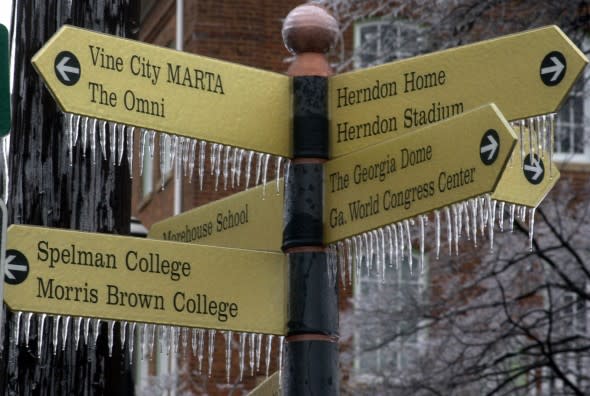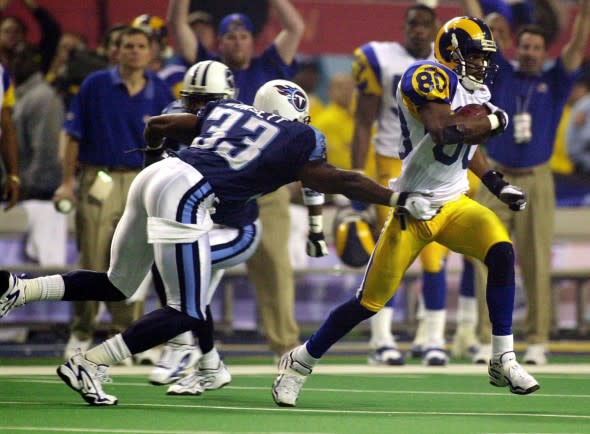The last time Atlanta hosted the Super Bowl, a major ice storm wreaked havoc
For the first time since Jan. 30, 2000, the NFL will crown its Super Bowl champion in Atlanta.
Sheltered in the confines of the state-of-the-art Mercedes-Benz Stadium, which replaced the Georgia Dome in 2017, fans attending Super Bowl 53 will not have to worry about inclement weather conditions between the Los Angeles Rams and New England Patriots on Sunday, Feb. 3.
However, even though the game in 2000 was indoors, the weather made its presence felt on the city that week.
While Super Bowl 34 featured a classic ending in which St. Louis Rams linebacker Mike Jones tackled Tennessee Titans wide receiver Kevin Dyson at the 1-yard-line, giving the Rams a 23-16 victory, the weather around the city was memorable as well.

An icy street sign on the campus of Morris Brown College shows the effects of an overnight ice storm in Atlanta Sunday, Jan. 23, 2000. An overnight storm caused power outages and hazardous driving conditions. Atlanta will host Super Bowl XXXIV on Sunday Jan. 30. (AP Photo/Dave Martin)
A major ice storm had left 500,000 in the dark across the Southeast, and the significant ice accumulation left many roads in neighborhoods in Atlanta with a "chaotic mix of scattered tree limbs, live wires and nonfunctioning traffic lights," the New York Times reported at the time.
"It was a wide-ranging storm, there were several waves of rain that came through and in this case it was cold enough that it didn't melt, and so there was ice everywhere," AccuWeather Chief Meteorologist Elliott Abrams said. "And [there were] very bad driving conditions and lots of power outages."
Cold, dense air moved in, but there was a layer of lighter warm air above, so the precipitation couldn't make it to the ground as snow, Abrams explained. In this scenario, the cold air was not deep enough near the ground for the rain drops to freeze into pellets before hitting the ground. If it had been sleet, it wouldn't have been as slippery.
About 1.49 inches of precipitation fell that Sunday. In the wake of the storm, cold air led to below-normal temperatures throughout the week of the game to the dismay of certain players.
"The weather ruined that Super Bowl. You couldn't go anywhere. It was like the whole city was shut down," quarterback Neil O'Donnell told Jim Wyatt of the Tennesseean in 2014.
Additionally, many players had to buy coats, and the Titans weren't able to make it to the Georgia Dome on the Saturday prior to the game due to icy travel conditions. This caused them to miss their official team picture.
Wyatt, who has reported on the Titans since the 1999 season and is now a senior writer for Titansonline, told AccuWeather that while he was not impacted by the icy driving conditions, the cold weather was a big deal that week, particularly for the Titans.
The team had spent Super Bowl week practicing outdoors at Georgia Tech's football facility. One week prior, they had won the AFC championship in balmy Jacksonville, Florida, and two weeks prior defeated the Indianapolis Colts inside a dome during the postseason's divisional round.

In this Jan. 30, 2000, file photo, St. Louis Rams wide receiver Issac Bruce (80) runs 73 yards for a touchdown as Tennessee Titans safety Anthony Dorsett (33) tries to tackle him during the fourth quarter of NFL football's Super Bowl XXXIV in Atlanta. The Rams won 23-16. (AP Photo/John Bazemore, File)
Both teams had their media availability at their separate hotels that week, Wyatt said. While the Rams were given use of a hotel ballroom, the Titans were provided tents which for the first several days of the week didn't have heaters. Players showed up to press conferences dressed in layers. For the Titans, this did not seem typical of a Super Bowl.
Wyatt said he remembered the Titans didn't feel like they were getting enough respect as the Rams, who were the favorites heading into the game.
"They kind of used that as a rallying cry during the early part of the week," Wyatt said.
Many players simply stayed inside their hotel most of the week due to the cold, according to Wyatt, who has done several retrospective articles talking to members of that Super Bowl team. He said that the weather is always a topic that's discussed.
At one point, several players tried to brave the cold, perhaps to an extreme. Wyatt recalled that a group of offensive lineman, as part of a bet, decided to drive back to the hotel with their car windows down and the air conditioner fully on.
"That was one of those funny, lighthearted stories that those guys share from that week," he said.
Wyatt recalled how many Titans fans looking to make the trip from Nashville to Atlanta were negatively impacted by the weather.
"I remember hearing the horror stories about people trying to get to Atlanta and how much trouble [they were having,]" he said.
The Super Bowl 53 Host Committee has made weather preparations a key part of their strategy for this year's week of events leading up to Super Sunday.
Back in May, the committee hosted a panel discussion to discuss planning preparations, according to the Atlanta Journal-Constitution (AJC).
With many outdoor events in the days prior to the game, the committee was addressing issues from where to provide shelters for visitors if it's raining to how to keep sidewalks clear if it's icy.
"We know we have to build a plan for the weather," committee CEO Brett Daniels told the AJC. "We want to expect the best and be prepared for the worst."

